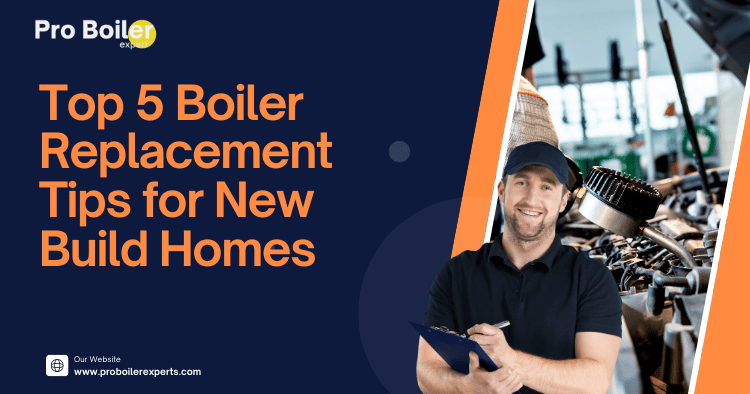Table of Contents
- Understanding Your Boiler Options
- Choosing the Right Size
- Efficiency Matters
- Professional Installation
- Regular Maintenance
When it comes to new builds, ensuring that your home is equipped with the right boiler system is paramount for comfort and efficiency. Replacing or installing a boiler can seem daunting, but with the right knowledge and guidance, you can make informed decisions that will benefit your home for years to come. Here are the top five tips for boiler replacement in new build homes.
1. Understanding Your Boiler Options
When selecting a boiler for your new build, you’ll encounter various types—combi, system, and regular boilers. Each type has its own unique features and benefits:
- Combi Boilers: These are compact and provide both heating and hot water directly from the boiler, making them a popular choice for smaller homes. Explore the benefits of combi boilers.
- System Boilers: Ideal for homes with higher hot water demands, system boilers store hot water in a cylinder while being fed by a central heating system. Learn more about system boilers.
- Regular Boilers: Suitable for larger homes with multiple bathrooms, they work with a hot water cylinder and a cold water storage tank. Consider the advantages of conventional boilers.
Tip: Consider the layout of your home and your family’s hot water usage when selecting the type of boiler.
FAQs:
- What type of boiler is best for my new build?
This depends on your home’s size and your hot water needs. Combi boilers are great for smaller homes, while larger homes may benefit from system or regular boilers. - Can I install a different type of boiler than what was originally in the house?
Yes, you can upgrade or change the boiler type, but you should consult with a professional to ensure compatibility with your heating system.
Further Reading: Guide to Choosing a Boiler
2. Choosing the Right Size
Selecting the right size boiler is crucial for efficient heating and hot water supply. An undersized boiler won’t be able to meet your household’s demand, leading to discomfort, while an oversized boiler can lead to energy wastage.
Sizing Considerations:
- Heat Loss Calculations: Conduct a heat loss calculation to determine how much heat your home loses. This will help assess the required output of your boiler.
- Number of Bathrooms: Consider how many bathrooms you have and their usage patterns. More bathrooms may require a larger boiler or a system boiler.
- Home Insulation: Well-insulated homes may require smaller boilers, as they retain heat more effectively.
Visual Aid: A simple table can help visualize the boiler size recommendations based on household needs:
| Household Size | Number of Bedrooms | Recommended Boiler Type |
|---|---|---|
| 1-2 people | 1-2 | Combi |
| 3-4 people | 3-4 | System |
| 5+ people | 4+ | Regular or System |
FAQs:
- How do I know if my boiler is the right size? A heating engineer can perform a heat load calculation to determine if your boiler meets your home’s needs.
- What happens if my boiler is too small? An undersized boiler may struggle to provide adequate heating and hot water, leading to increased energy bills and discomfort.
Further Reading: Boiler Sizing Guide
3. Efficiency Matters
Boiler efficiency is a key factor in reducing energy bills and minimizing your carbon footprint. Look for boilers with a high Energy Efficiency Rating (A-rated or above), which indicates that they convert a large percentage of fuel into usable heat.
Benefits of High-Efficiency Boilers:
- Lower Energy Bills: More efficient boilers consume less energy, saving you money in the long run. Check out the top 5 high-efficiency boilers for optimal home comfort.
- Environmental Impact: Reduced fuel consumption means fewer emissions, making your home more environmentally friendly.
- Government Incentives: Many governments offer incentives for upgrading to energy-efficient systems, which can help offset initial costs. Learn about government incentives for boiler energy efficiency.
Did You Know?: Most modern boilers have an efficiency rating between 90% and 98%.
FAQs:
- What is the average efficiency of a modern boiler? Most modern boilers have an efficiency rating between 90% and 98%.
- Are high-efficiency boilers more expensive? They can be more expensive upfront, but the savings on energy bills can lead to lower costs over time.
Further Reading: Energy Efficiency in Boilers
4. Professional Installation
While DIY projects can be tempting, installing a boiler is a complex task that requires expertise. Hiring a qualified professional ensures that the installation meets safety standards and local regulations.
Why Choose a Professional:
- Safety: Incorrect installation can pose safety risks, including gas leaks or carbon monoxide poisoning.
- Warranty: Many boiler manufacturers require professional installation to validate warranties.
- Performance: A professional can optimize the setup for maximum efficiency and performance. Discover the essential pre-installation checklist for your new boiler.
Important: Always check for certified professionals through bodies like the Gas Safe Register in the UK or equivalent organizations in your country.
FAQs:
- How do I find a qualified installer? Look for certified professionals through bodies like the Gas Safe Register in the UK or equivalent organizations in your country.
- What should I expect during installation? A professional will assess your home, install the boiler, and conduct tests to ensure everything is functioning correctly.
Further Reading: Finding a Qualified Installer
5. Regular Maintenance
Once your boiler is installed, regular maintenance is essential to keep it running efficiently and safely. Schedule annual servicing with a qualified technician to ensure that everything is in good working order. Check out essential boiler maintenance tips to keep your system efficient.
Maintenance Tips:
- Check for Leaks: Regularly inspect the boiler for any signs of leaks or corrosion.
- Bleed Radiators: This simple task can improve heating efficiency by removing trapped air.
- Monitor Pressure: Keep an eye on the pressure gauge; it should typically be between 1-1.5 bar.
Reminder: It’s recommended to have your boiler serviced at least once a year to ensure optimal performance.
FAQs:
- How often should I service my boiler? It’s recommended to have your boiler serviced at least once a year.
- What are the signs that my boiler needs maintenance? Unusual noises, fluctuating pressure, or inconsistent heating can indicate that your boiler requires attention.
Further Reading: Boiler Maintenance Checklist
By following these tips, you can ensure that your new build home is equipped with the right boiler system that meets your needs and provides comfort for years to come. Remember, investing time in research and professional help can save you money and hassle in the long run!





